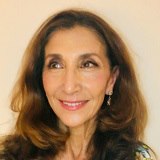Krebs Memorial Scholarship - Mahvash Tavassoli
News, Sep 01 2007
Mahvash Tavassoli
From a very young age I wanted to study Natural Sciences and to have a career in medical research. Having obtained high grades in science modules and a first degree in Biochemistry, I came to the UK with the aim to do a PhD in biomedical sciences. However, shortly after my arrival in the UK the political situation in my country dramatically changed which resulted in the termination of all financial support. I was very lucky that in 1983 I was offered a PhD position in Professor Sydney Shall’s laboratory at the University of Sussex. This were very exciting times when the human oncogenes had just been discovered and investigations into their role in cancer was starting to be unravelled. The atmosphere in the laboratory was stimulating and exciting with several young motivated scientists working there, many went to be pioneers in their field of cell cycle, cellular signalling, DNA Damage Repair, including Professor Sir Paul Nurse, Professors David Beach, Farzin Farzaneh and others. I felt privileged to study and train with such great scientists. However, very soon I realised that the tuition fees and living expenses were far in excess of my means and I was very close to losing my PhD place. Sydney was an extremely supportive supervisor and having experienced hardship himself, explored various ways to find that support. He brought to my attention a call for a new scholarship that had just been launched by the Biochemical Society to commemorate the contributions of Sir Hans Krebs to Biochemistry.
In December 1984, I received a letter from the Chairman of the committee Sir Hans Kornberg (who had himself studied with Sir Hans Krebs), informing me of the award of the 1st Krebs Memorial Scholarship to me. Sir Hans’ letter closed with the words “the award to you is therefore not only recognition of your talent and potential but is wholly in accord with Sir Hans Krebs’ principals”. These were extremely encouraging words that would have moved anyone, but they also brought a huge sense of responsibility.
This was a proud and turning point in my career and life. I completed my DPhil in Biochemistry in 1987. Shortly after the completion of my PhD I obtained a fellowship from the International Union Against Cancer (UICC) to spend a short postdoctoral training fellowship in the laboratory of Prof Robert Eisenman at the Fred Hutchinson Cancer Research Centre in Seattle, USA. When I returned to the UK, I was offered a postdoctoral Fellowship to work in the Medical Research Centre at the University of Sussex to research into the role of the EGFR receptor family tyrosine kinases in breast and ovarian cancer. In 1990 I was awarded a Research Fellowship by the Cancer Research Campaign (now CRUK) to establish my own group to continue to study the mechanism of c-erbB2 signalling activation. In 1993 I was awarded an EMBO fellowship to work in the laboratory of Professor Axel Ullrich at the Max Planck institute in Munich. To have worked with these internationally recognised leaders in the field made me once again very aware of the prestigious opportunities the Krebs Memorial Scholarship had opened to me.
In April 1995 I was appointed as a lecturer in the Department of Oral Medicine and Pathology at King’s College London where I have been working ever since. In Sept 2000 I was promoted to senior lecturer and in 2006 to Reader in Molecular Pathology. In September 2007 I was appointed Professor of Molecular Oncology, at King’s College London where I lead a research team focused on the understanding of the molecular mechanisms of radiotherapy response in solid tumours, through international collaborations we aim to develop more effective, less toxic cancer therapeutics.
The proudest achievement of my career has been, and still is to motivate and support young scientists from different backgrounds and countries, encourage them not to give up under hardship, and to pursuit their dreams, I am very proud that many of my PhD students have become established successful scientists all around the world.
I will be forever grateful to the Biochemical Society and to the Trustees of the Krebs Memorial Scholarship, because without their support I simply would not have been able to achieve my dream to have a successful and enjoyable scientific career.
I am very happy to be part of the committee for the selection of students for the Krebs’ Memorial Scholarship. As I read the applications I remember my own circumstances over 35 years, and profoundly appreciate the importance of this Scholarship and the real difference this program can make to the life of able students from many parts of the world, who would otherwise be unable to achieve their dream due to special circumstances often out or their control.

